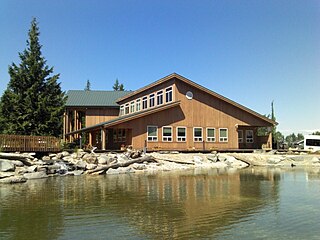
The Squaxin Island Tribe are the descendants of several Lushootseed clans organized under the Squaxin Island Indian Reservation, a Native American tribal government in western Washington state.

The Menominee Indian Reservation is an Indian reservation located in northeastern Wisconsin held in trust by the United States for the Menominee Tribe of Wisconsin. It is the largest Indian reservation east of the Mississippi River. In the Menominee language, it is called Omāēqnomenēw-Otāēskonenan, "Menominee Thing Set Apart", or alternatively omǣqnomenēw-ahkīheh, "in the Menominee Country".

In the United States, increased restrictions and labeling of cannabis as a poison began in many states from 1906 onward, and outright prohibitions began in the 1920s. By the mid-1930s cannabis was regulated as a drug in every state, including 35 states that adopted the Uniform State Narcotic Drug Act. The first national regulation was the Marihuana Tax Act of 1937.

The use, sale, and possession of cannabis over 0.3% THC in the United States, despite laws in many states permitting it under various circumstances, is illegal under federal law. As a Schedule I drug under the federal Controlled Substances Act (CSA) of 1970, cannabis over 0.3% THC is considered to have "no accepted medical use" and have a high potential for abuse and physical or psychological dependence. Cannabis use is illegal for any reason, with the exception of FDA-approved research programs. However, individual states have enacted legislation permitting exemptions for various uses, including medical, industrial, and recreational use.

Cannabis in Oregon is legal for both medical and recreational use. In recent decades, the U.S. state of Oregon has had a number of legislative, legal, and cultural events surrounding use of cannabis. Oregon was the first state to decriminalize the possession of small amounts of cannabis, and among the first to authorize its use for medical purposes. An attempt to recriminalize possession of small amounts of cannabis was turned down by Oregon voters in 1997.

The Flandreau Indian Reservation is an Indian reservation, belonging to the federally recognized Flandreau Santee Sioux Tribe of South Dakota. They are Santee Dakota people, part of the Sioux tribe of Native Americans. The reservation is located in Flandreau Township in central Moody County in eastern South Dakota, near the city of Flandreau.

Cannabis in California has been legal for medical use since 1996, and for recreational use since late 2016. The state of California has been at the forefront of efforts to liberalize cannabis laws in the United States, beginning in 1972 with the nation's first ballot initiative attempting to legalize cannabis. Although it was unsuccessful, California would later become the first state to legalize medical cannabis through the Compassionate Use Act of 1996, which passed with 56% voter approval. In November 2016, California voters approved the Adult Use of Marijuana Act with 57% of the vote, which legalized the recreational use of cannabis.

Cannabis in Colorado has been legal for medical use since 2000 and for recreational use since late 2012. On November 7, 2000, 54% of Colorado voters approved Amendment 20, which amended the State Constitution to allow the use of marijuana in the state for approved patients with written medical consent. Under this law, patients may possess up to 2 ounces (57 g) of medical marijuana and may cultivate no more than six marijuana plants. Patients who were caught with more than this in their possession could argue "affirmative defense of medical necessity" but were not protected under state law with the rights of those who stayed within the guidelines set forth by the state. The Colorado Amendment 64, which was passed by voters on November 6, 2012, led to recreational legalization in December 2012 and state-licensed retail sales in January 2014. The policy has led to cannabis tourism. There are two sets of policies in Colorado relating to cannabis use: those for medicinal cannabis and for recreational drug use along with a third set of rules governing hemp.

Oregon Ballot Measure 80, also known as the Oregon Cannabis Tax Act, OCTA and Initiative-9, was an initiated state statute ballot measure on the November 6, 2012 general election ballot in Oregon. It would have allowed personal marijuana and hemp cultivation or use without a license and created a commission to regulate the sale of commercial marijuana. The act would also have set aside two percent of profits from cannabis sales to promote industrial hemp, biodiesel, fiber, protein, and oil.

In the United States, the use and possession of cannabis is illegal under federal law for any purpose by way of the Controlled Substances Act of 1970 (CSA). Under the CSA, cannabis is classified as a Schedule I substance, determined to have a high potential for abuse and no accepted medical use. Despite this, most states have legalized either or both the medical and recreational use of cannabis.

The legal history of cannabis in the United States began with state-level prohibition in the early 20th century, with the first major federal limitations occurring in 1937. Starting with Oregon in 1973, individual states began to liberalize cannabis laws through decriminalization. In 1996, California became the first state to legalize medical cannabis, sparking a trend that spread to a majority of states by 2016. In 2012, Washington and Colorado became the first states to legalize cannabis for recreational use.

Oregon Ballot Measure 91, also known as the Control, Regulation, and Taxation of Marijuana and Industrial Hemp Act was a 2014 ballot measure in the U.S. state of Oregon. Its passage legalized the "recreational use of marijuana, based on regulation and taxation to be determined by the Oregon Liquor Control Commission".

Initiative 71 was a voter-approved ballot measure in Washington, D.C., that legalized the recreational use of cannabis. The short title of the initiative was "Legalization of Possession of Minimal Amounts of Marijuana for Personal Use Act of 2014". The measure was approved by 64.87% of voters on November 4, 2014 and went into full effect on February 26, 2015.

Cannabis in Wisconsin is illegal for recreational use. Possession of any amount is punishable by up to 6 months in prison and a $1000 fine for a first offense. A second offense is punished as a felony with up to 3.5 years in prison and up to a $10,000 fine. At the local level, however, numerous municipalities and counties have decriminalized cannabis or lessened penalties for minor possession offenses. Medical use is legal only in the form of low-THC cannabis oil.

Cannabis in Virginia is legal for medical use and recreational use. The first medical marijuana dispensary opened in August 2020, and adult recreational use became legalized in July 2021.

Cannabis in Oklahoma is illegal for recreational use, but legal for medical use with a state-issued license, while CBD oil derived from industrial hemp is legal without a license.

Cannabis in Missouri is legal for recreational use. A ballot initiative to legalize recreational use passed by a 53–47 margin on November 8, 2022. Possession for adults 21 and over became legal on December 8, 2022, with the first licensed sales occurring on February 3, 2023.

Cannabis in Washington relates to a number of legislative, legal, and cultural events surrounding the use of cannabis. On December 6, 2012, Washington became the first U.S. state to legalize recreational use of marijuana and the first to allow recreational marijuana sales. The state had previously legalized medical marijuana in 1998. Under state law, cannabis is legal for medical purposes and for any purpose by adults over 21.

Elevation is a cannabis shop on the Squaxin Island Tribe trust lands at Kamilche, Washington, across Washington State Route 108 from the tribe's Little Creek Casino. It became the first tribally operated cannabis shop in the United States in November 2015.


















